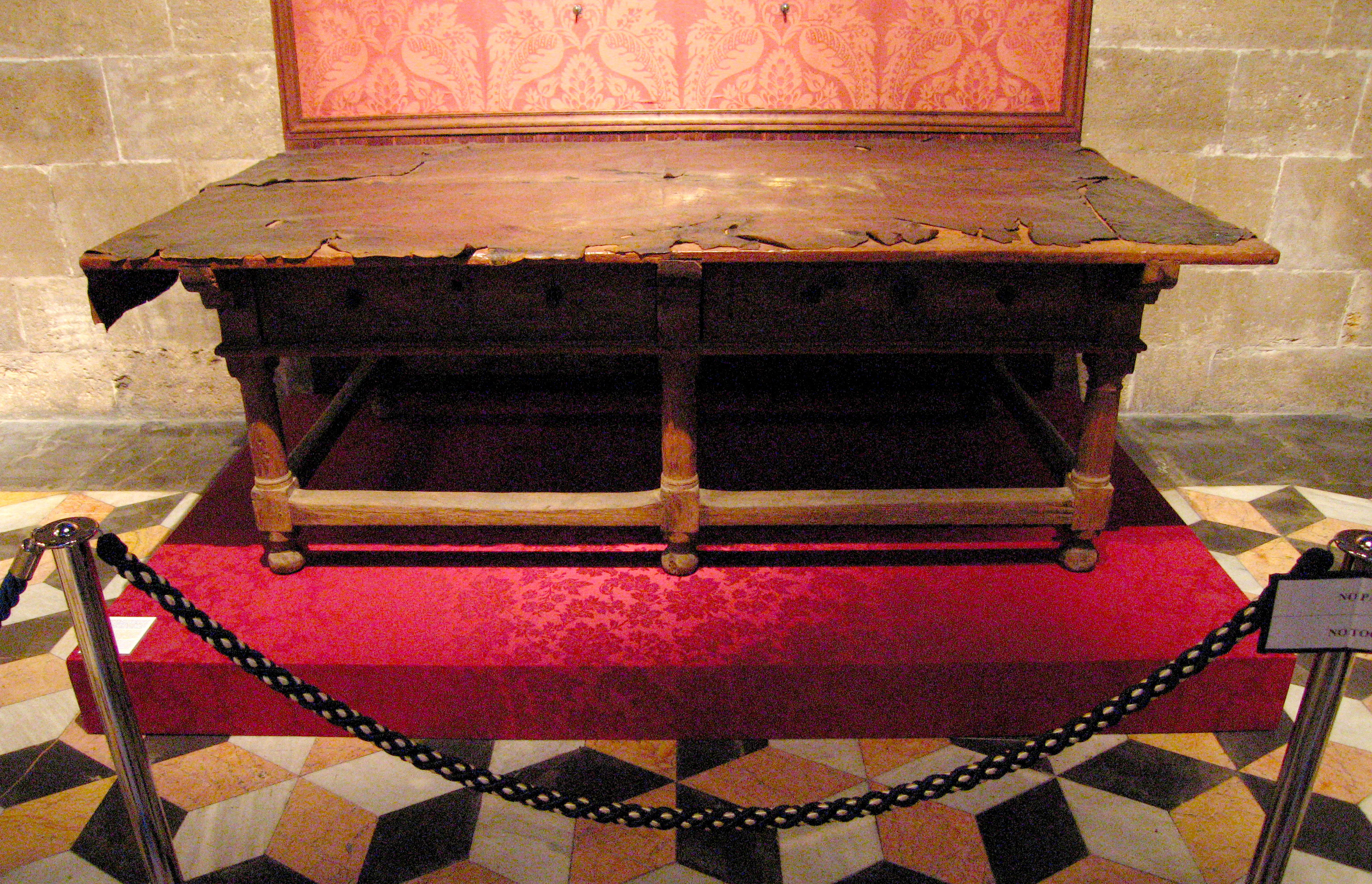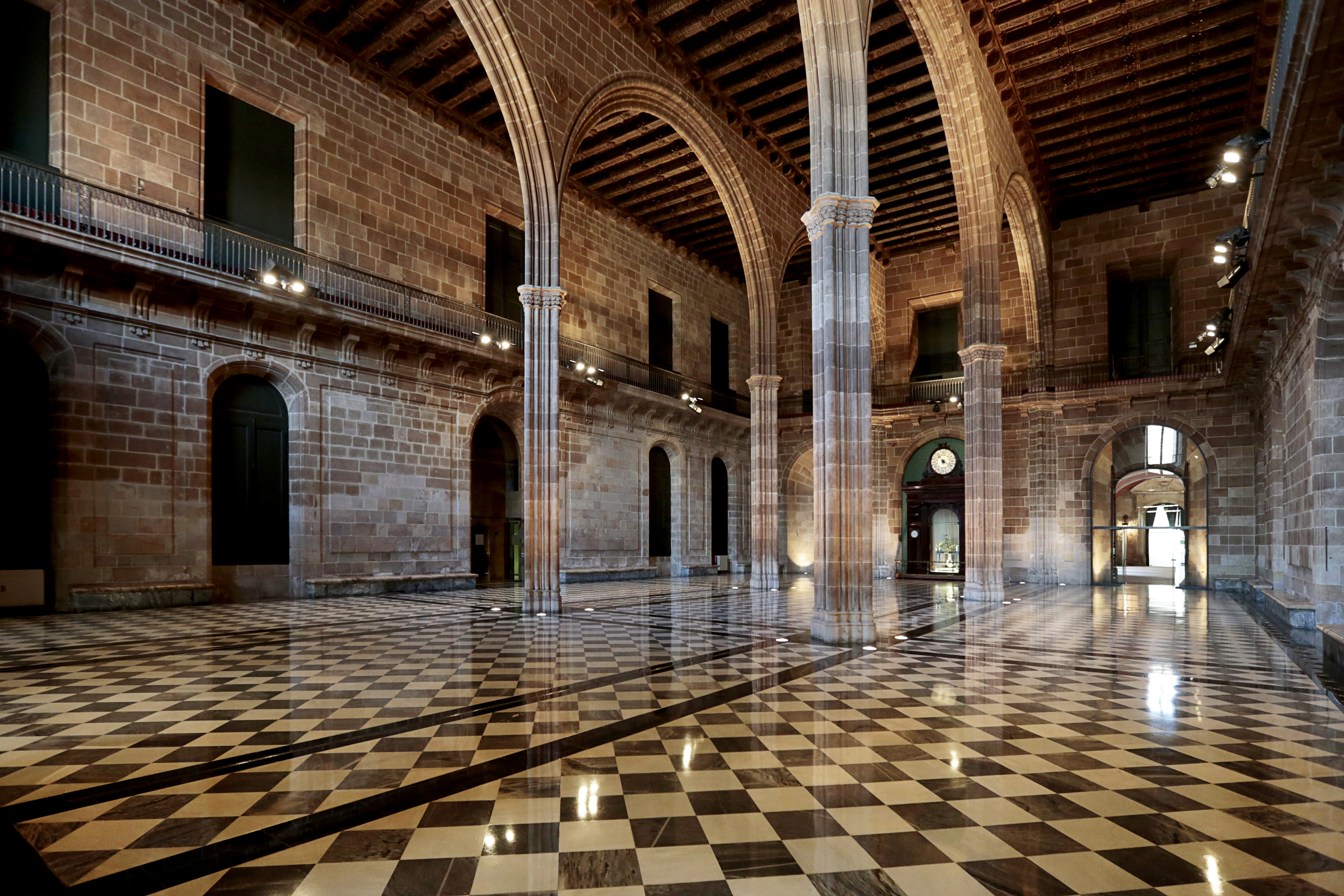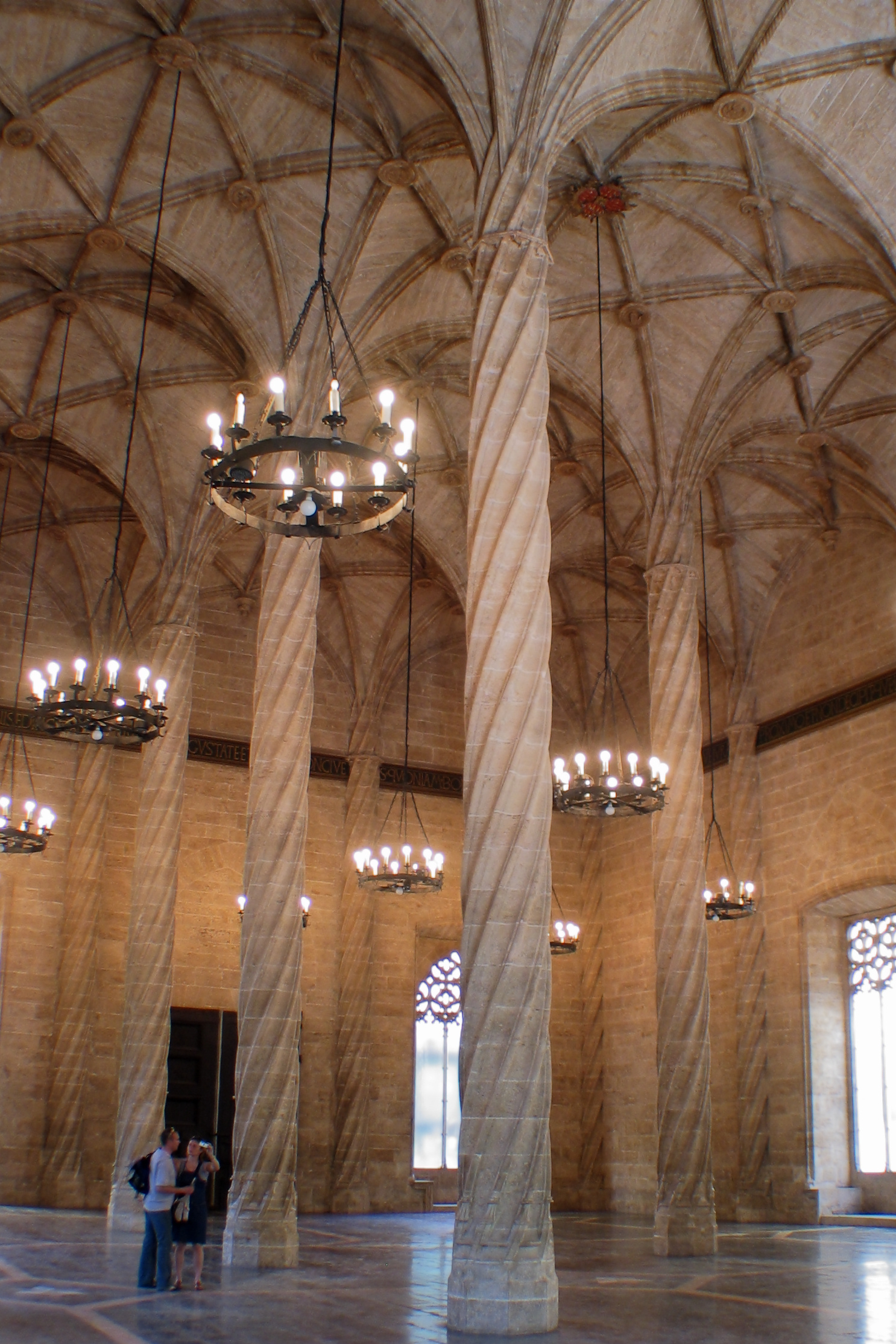Taula De Canvi on:
[Wikipedia]
[Google]
[Amazon]
 The Taula de canvi ("Table of change" in Catalan), also Taula de cambi or simply Taula, was a type of municipal public bank that existed in the
The Taula de canvi ("Table of change" in Catalan), also Taula de cambi or simply Taula, was a type of municipal public bank that existed in the
 The first Taula de canvi was created following a request of the city of Barcelona's main governing body, the
The first Taula de canvi was created following a request of the city of Barcelona's main governing body, the
 Several successive ''Taules de canvi'' were established in
Several successive ''Taules de canvi'' were established in
 The Taula de canvi ("Table of change" in Catalan), also Taula de cambi or simply Taula, was a type of municipal public bank that existed in the
The Taula de canvi ("Table of change" in Catalan), also Taula de cambi or simply Taula, was a type of municipal public bank that existed in the Crown of Aragon
The Crown of Aragon ( , ) an, Corona d'Aragón ; ca, Corona d'Aragó, , , ; es, Corona de Aragón ; la, Corona Aragonum . was a composite monarchy ruled by one king, originated by the dynastic union of the Kingdom of Aragon and the County of ...
in the late Middle Ages and early modern period. The Taula de canvi of Barcelona
Barcelona ( , , ) is a city on the coast of northeastern Spain. It is the capital and largest city of the autonomous community of Catalonia, as well as the second most populous municipality of Spain. With a population of 1.6 million within c ...
, created in 1401 and still extant in diminished form in the 19th century, has been described as the first-ever central bank
A central bank, reserve bank, or monetary authority is an institution that manages the currency and monetary policy of a country or monetary union,
and oversees their commercial banking system. In contrast to a commercial bank, a central ba ...
.
Barcelona
 The first Taula de canvi was created following a request of the city of Barcelona's main governing body, the
The first Taula de canvi was created following a request of the city of Barcelona's main governing body, the Consell de Cent
The Consell de Cent (, meaning in English "Council of One Hundred") was a governmental institution of Barcelona. It was established in the 13th century and lasted until the 18th century.
Its name derives from the number of its members: one hundr ...
, calling for the establishment of a public bank on 25 April 1400. It ceremonially started its operations on 20 January 1401, inside Barcelona's '.
Structure and governance
The Taula'scharter
A charter is the grant of authority or rights, stating that the granter formally recognizes the prerogative of the recipient to exercise the rights specified. It is implicit that the granter retains superiority (or sovereignty), and that the rec ...
, dated 1405 or 1412 depending on authors, is the oldest preserved public bank regulation. Its design remained essentially unchanged for 300 years until the early 18th century. The Taula was a fully-owned operation of the city with a city guarantee of its deposits, and there is no evidence that it had capital
Capital may refer to:
Common uses
* Capital city, a municipality of primary status
** List of national capital cities
* Capital letter, an upper-case letter Economics and social sciences
* Capital (economics), the durable produced goods used fo ...
of its own. The city appointed the Taula's ''taulers'' who worked on the table and its cashier for two-years fixed terms and paid their salaries. Other Taula officers, including its regent, chief of deposits, ''credencer'' in charge of first bookings, and notary, were appointed for life. The Taula's coffers had six keys, of which two were held by each ''tauler'' and two by the city councillors. The Taula was also subject to frequent inspection by municipal auditors.
In 1609, the city council created the Bank of the City of Barcelona (''Banc de la Ciutat'') as an independent department of the municipal administration, to accept lower-quality coin
A coin is a small, flat (usually depending on the country or value), round piece of metal or plastic used primarily as a medium of exchange or legal tender. They are standardized in weight, and produced in large quantities at a mint in order t ...
s than were allowed under the Taula's regulation. In practice, that bank appears to have operated as an extension of the Taula rather than a separate let alone competing institution.
Operations
The Taula's objective was to provide an efficient and stable central deposit and giro transfer system, and, in its initial decades of operations, to provide funding to the city. From 1413 it also served asfiscal agent
A fiscal agent, fiscal sponsor, or financial agent is a proxy that manages fiscal matters on behalf of another party. A fiscal agent may assist in the redemption of bonds or coupons at maturity, disbursing dividends, and handling tax issues. For ...
for the Generalitat of Catalonia
The Generalitat de Catalunya (; oc, label= Aranese, Generalitat de Catalonha; es, Generalidad de Cataluña), or the Government of Catalonia, is the institutional system by which Catalonia politically organizes its self-government. It is formed ...
.
It accepted both sight deposits and term deposits, in coin
A coin is a small, flat (usually depending on the country or value), round piece of metal or plastic used primarily as a medium of exchange or legal tender. They are standardized in weight, and produced in large quantities at a mint in order t ...
or jewellery
Jewellery ( UK) or jewelry ( U.S.) consists of decorative items worn for personal adornment, such as brooches, rings, necklaces, earrings, pendants, bracelets, and cufflinks. Jewellery may be attached to the body or the clothes. From a weste ...
, from residents of the city or its immediate surrounding; deposits were transferable as long as that did not result in overdraft
An overdraft occurs when something is withdrawn in excess of what is in a current account. For financial systems, this can be funds in a bank account. For water resources, it can be groundwater in an aquifer. In these situations the account is s ...
, thus the taula's characterization as an early central bank. Cheques
A cheque, or check (American English; see spelling differences) is a document that orders a bank (or credit union) to pay a specific amount of money from a person's account to the person in whose name the cheque has been issued. The pers ...
were in use from the 1520s at the latest. The bank operated on its eponymous table, installed in Barcelona's and covered with a carpet decorated with the arms of Barcelona. It was open every working day from 8 to 10am.
From its inception the Taula was systemically significant. Its oldest surviving book records over 500 individual accounts. It kept the deposits of the Generalitat
Generalitat (, literally in English 'Generality') is the name of two major medieval and early modern political institutions and their modern-day analogues in Kingdom of Spain. The ancient Principality of Catalonia and the Kingdom of Valencia were ...
, of the Barcelona Cathedral
The Cathedral of the Holy Cross and Saint Eulalia ( ca, Catedral de la Santa Creu i Santa Eulàlia), also known as Barcelona Cathedral, is the Gothic cathedral and seat of the Archbishop of Barcelona, Catalonia, Spain. The cathedral was constr ...
chapter, of religious institutions, of trade bodies, of military orders, and of the Aragonese monarchs.
The Taula was granted a monopoly on certain types of deposits, e.g. those of minors. From 1446 to 1499 it also had a legal monopoly on the clearing of bills of exchange
A negotiable instrument is a document guaranteeing the payment of a specific amount of money, either on demand, or at a set time, whose payer is usually named on the document. More specifically, it is a document contemplated by or consisting of a ...
. It competed with private banks to attract deposits, but unlike these did not pay interest on sight deposits.
The Taula suspended the convertibility of deposits in 1463-1468 during the Catalan Civil War, 1640-1653 during the Reapers' War, and 1706-1713 during the War of the Spanish Succession
The War of the Spanish Succession was a European great power conflict that took place from 1701 to 1714. The death of childless Charles II of Spain in November 1700 led to a struggle for control of the Spanish Empire between his heirs, Phi ...
; in the two latter episodes the ''Banc de la Ciutat'' also suspended payments. In 1468, existing depositors were offered the option to convert to bonds of the city at 5 percent, or accept prolonged non-convertibility. After that restructuring and until the 17th century, lending to the city was prohibited. Following the Siege of Barcelona (1713–14), the Taula continued to exist but in restricted form without giro banking, while the ''Banc'' was entirely separated from the city and brought under direct Spanish state control. Another episode of payments suspension occurred in 1812. The Taula's remaining activities were gradually discontinued or taken over by other institutions. It was eventually absorbed by the Bank of Spain
The Bank of Spain ( es, link=no, Banco de España) is the central bank of Spain. Established in Madrid in 1782 by Charles III, today the bank is a member of the European System of Central Banks and is also Spain's national competent authority ...
in 1853 and stopped paying its last staff in 1865.
Valencia
 Several successive ''Taules de canvi'' were established in
Several successive ''Taules de canvi'' were established in Valencia
Valencia ( va, València) is the capital of the Autonomous communities of Spain, autonomous community of Valencian Community, Valencia and the Municipalities of Spain, third-most populated municipality in Spain, with 791,413 inhabitants. It is ...
, respectively from 1408 to 1416 (or 1418), 1519 to 1649 (''Taula Nova''), and 1649 to 1719 (''Taula Novisima''). The Taula of Valencia was a deposit bank and fiscal agent
A fiscal agent, fiscal sponsor, or financial agent is a proxy that manages fiscal matters on behalf of another party. A fiscal agent may assist in the redemption of bonds or coupons at maturity, disbursing dividends, and handling tax issues. For ...
of the city.
Girona
A royal document authorized the creation of a Taula de canvi inGirona
Girona (officially and in Catalan , Spanish: ''Gerona'' ) is a city in northern Catalonia, Spain, at the confluence of the Ter, Onyar, Galligants, and Güell rivers. The city had an official population of 103,369 in 2020. Girona is the capit ...
on 23 January 1443. The bank was again established by the City Council on 28 February 1568 and operated until being finally closed by order of King Philip V in 1741.
Other ''Taules de canvi''
''Taules de canvi'' were also created inPerpignan
Perpignan (, , ; ca, Perpinyà ; es, Perpiñán ; it, Perpignano ) is the prefecture of the Pyrénées-Orientales department in southern France, in the heart of the plain of Roussillon, at the foot of the Pyrenees a few kilometres from the ...
(1404), Vic
Vic (; es, Vic or Pancracio Celdrán (2004). Diccionario de topónimos españoles y sus gentilicios (5ª edición). Madrid: Espasa Calpe. p. 843. ISBN 978-84-670-3054-9. «Vic o Vich (viquense, vigitano, vigatán, ausense, ausetano, ausonense) ...
(1413, 1583), Tarragona
Tarragona (, ; Phoenician: ''Tarqon''; la, Tarraco) is a port city located in northeast Spain on the Costa Daurada by the Mediterranean Sea. Founded before the fifth century BC, it is the capital of the Province of Tarragona, and part of Tarr ...
(1420), Palma de Mallorca (1507), Lleida
Lleida (, ; Spanish: Lérida ) is a city in the west of Catalonia, Spain. It is the capital city of the province of Lleida.
Geographically, it is located in the Catalan Central Depression. It is also the capital city of the Segrià comarca, as ...
(1585), and Cervera (1599). A ''Taula de comunes depósitos'' also existed in Zaragoza
Zaragoza, also known in English as Saragossa,''Encyclopædia Britannica'"Zaragoza (conventional Saragossa)" is the capital city of the Zaragoza Province and of the autonomous community of Aragon, Spain. It lies by the Ebro river and its tributar ...
from the 15th to the 18th centuries. No comparable institutions appear to have existed in Castile until the creation of the Banco Nacional de San Carlos in 1782.
See also
*Bank of Saint George
The Bank of Saint George ( it, Casa delle compere e dei banchi di San Giorgio or informally as ''Ufficio di San Giorgio'' or ''Banco'') was a financial institution of the Republic of Genoa. It was founded in 1407 to consolidate the public debt ...
* Banco del Giro
The Banco del Giro ( Venetian: ''Banco del Ziro''), also Banco Giro or Bancogiro, sometimes referred to in English as the Bank of Venice, was a public bank created by the Republic of Venice. It was governed by a magistrate called the ''Deposita ...
* Bank of Amsterdam
The Bank of Amsterdam ( nl, Amsterdamsche Wisselbank, lit=Exchange Bank of Amsterdam) was an early bank, vouched for by the city of Amsterdam, and established in 1609. It was the first public bank to offer accounts not directly convertible to co ...
* Hamburger Bank
The Hamburger Bank was a public credit institution founded in 1619 by the Free City of Hamburg. It operated independently until 31 December 1875, when it became part of the newly created Reichsbank.
History
The Hamburg City Council made the de ...
Notes
Crown of Aragon History of Catalonia 1401 in Europe Former central banks {{finance-stub